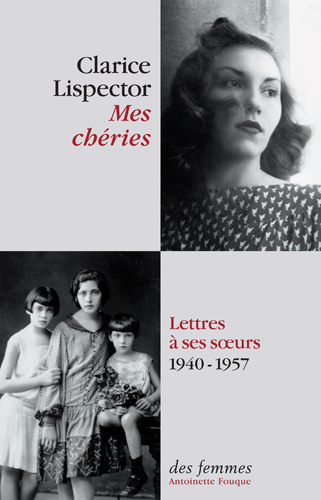, Exhibition at the Paris Book Fair. IMS Clarice Lispector, 2015. Disponível em: https://site.claricelispector.ims.com.br/en/2015/04/13/exposicao-no-salao-do-livro-de-paris/. Acesso em: 27 July 2024.
At the 35th edition of the Paris Book Fair, one of the most important literary events today, Brazil was the country of honor. The program took place between March 20th and 23rd of that year and was marked by an exhibition dedicated to Clarice Lispector at Éditions des Femmes, the publishing house responsible for the launch of Mes chérie – Lettres à ses sœurs. The book, organized by Teresa Monteiro and prefaced by Nádia Battella Gotlib, consists of 120 letters sent to her sisters Tânia and Elisa Lispector during the 1940s and 1950s, a period in which Clarice accompanied her diplomat husband Maury Gurgel Valente in several countries. Mes chérie, which has already been translated and published in Spanish (Queridas mías) by the publisher Siruela, reveals an intimate and affective side of the author.
Also on the occasion of the Book Salon, the interview with Paulo Gurgel Valente produced by the Moreira Salles Institute as one of the celebrations of the Clarice’s Hour event, in December 2014, was subtitled and broadcast at the French publisher’s venue.
See also
 by Equipe IMS
by Equipe IMS
On December 10th, IMS Rio celebrates Clarice Lispector’s birthday. This year, we will present, in a single screening, the short film Perto de Clarice (Close to Clarice), by João Carlos Horta, from 1982, in a new digital version based on the 35mm original preserved by the Audiovisual Technical Center (CTAv). After the film screening, there will be a conversation between the writer Heloisa Buarque de Holanda, who was involved in the making of the film and is the director's widow, and Teresa Montero, author of the most recent biography of the writer, À procura da própria coisa (In Search of the Thing Itself – Rocco, 2021), mediated by the IMS literature consultant, the poet Eucanaã Ferraz.
 by Mell Brites
by Mell Brites
More or less fantastic in their plots, these children’s stories reveal narrators who, stripped almost completely of their fictional character, are very similar to the author: they are mothers, writers, they go by the initials “C.L.,” or even say their name is Clarice. Thus, if there is a horizontal posture in these narrators in which respect for the particularities of childhood is presupposed, this same movement also shows the desire to become a little more like a child.
 by Rafael Juliao
by Rafael Juliao
“I wanted to announce the following: the person I love most in life is named Clarice Lispector.” This affirmation was made by Cazuza.
 by Bruno Cosentino
by Bruno Cosentino
Caetano Veloso says that when he showed the acoustic version of his song “Odeio” (I hate), which would be included on the Cê album, to his friend and composer Jorge Mautner, the latter cried and told him that it was the most beautiful love song that he had ever heard.
 by Elizama Almeida
by Elizama Almeida
Paulo Gurgel Valente, Clarice's son, spoke with Eucanaã Ferraz and Elizama Almeida and recalls, for example, the personalities who frequented his home.
 by Elizama Almeida
by Elizama Almeida
Mineirinho, one of the Rio de Janeiro police’s most wanted criminals during the 1960s. José Miranda Rosa earned this nickname, naturally, for being born in the state of Minas Gerais.







